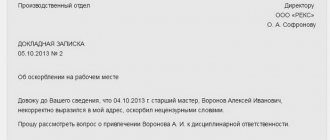To live in a modern metropolis, citizens have to work every day, earning financial resources for a full-fledged existence. In the current situation, most people spend an impressive amount of time in the office. We leave the apartment early in the morning and return to it after sunset. It is not surprising that work becomes a second home for us, in which people with different characters are forced to coexist in harmony. Rarely do all team members easily find a common “language” with each other, avoiding quarrels on professional grounds. Often, conflicts arise in new “families” caused by inconsistency in the internal worlds of employees. Working in a stressful environment where negative emotions are in the air is not a practical solution and jeopardizes the profitability and productivity of the enterprise.
It is pointless to endure insults from colleagues, hoping for an end to regular ridicule, because the “offenders” will not stop, feeling their impunity
Stinging jokes or caustic ridicule, obscene statements or regular attacks, reports to superiors or constant psychological impact - these are the variety of “tests” that employees have to face at work. Colleagues who choose, in their opinion, the most vulnerable person in the team, have fun and amuse themselves, insulting the honor and personal dignity of the employee. It is not surprising that the employee’s mental state is disturbed. Experiencing discomfort, a person does not want to return to work, driven by the instinct of self-preservation. Not every person is able to fight back against “offenders”; some people prefer to ignore the ridicule of colleagues without defending their self-esteem. However, enduring attacks from ill-wishers is an irrational decision that strokes the ego of a boorish team. You need to take care of yourself in time by finding the answer to the following question: What to do if you are insulted at work?
Insult as a legal term
Insult is a humiliation of a person’s honor and dignity. Signs of insult include the following factors:
- intentionally committing offensive acts;
- an offensive message may be exposed: in the form of obscene language,
- in comparison with animals or objects,
- display of indecent gestures.
It is worth noting: insult does not always mean the use of obscene language.
Speech consisting only of words of a literary language, but carrying an obscene, offensive meaning, is also considered an offense. The insult can be inflicted verbally or in writing, or contained in an audio or video recording.
Let's look at an example of what can be considered an insult, as a fact of an administrative offense. A man came to the post office to receive a registered letter. Seeing the huge queue, he began to be indignant, using profanity. This act cannot be classified as an insult. If a man addressed these words to a specific postal employee, then it would be considered an insult.
Insult at work is a special case of an administrative offense. Insult during the work process can be caused:
- colleague,
- boss,
- by a third party.
Let's consider further what kind of insult in the workplace can be.
Legal regulation of the situation
An insult during the work process can be inflicted on both an individual and a government representative. Various legislative codes deal with the regulation of these conflicts.
Insult to physical faces are a manifestation of interpersonal relationships, therefore the measures of influence are indicated in the Code of Administrative Offenses (CAO) of the Russian Federation, in Article 5.61. The Constitution guarantees the protection of the honor and dignity of every citizen of the Russian Federation; this is stated in Chapter 21. If the insult is combined with the use of real threats to health or life, then this is classified as a criminal offense and, accordingly, is under the jurisdiction of the Criminal Code. Find out here what the punishment is according to the Criminal Code of the Russian Federation for threats of violence.
Insulting a citizen in public service entails criminal liability. Such conflicts are considered by the Criminal Code (CC) of the Russian Federation. More information about insulting a government official can be found on the pages of our Internet portal - https://lexconsult.online/5855-privlechenie-k-ugolovnoi-otvetstvennosti-za-oskorblenie-predstavitelya-vlasti.
Measures of influence on the offender
Evidence of guilt
Regardless of which authority the victim applies to, the main condition for punishing the offender will be correctly collected high-quality evidence of his guilt. Evidence may include video recordings from office surveillance cameras, audio recordings from a voice recorder, as well as testimony from witnesses who witnessed the conflict.
The most common type of harassment in the workplace is when the employee is the victim and the boss is the offender. Regardless of who initiated the insult, there are several ways to adequately, without using retaliatory insults, punish the instigator of the conflict:
- contact the police;
- write a statement to the prosecutor's office;
- file a lawsuit for personal injury;
- solve a problem at the enterprise where the citizen works by drawing up a memo.
It is logical that if the insult came from a work colleague, then you need to complain to your superiors. If your boss insulted you, then it is better to contact the prosecutor’s office, the police or the court.
An appeal to any of the listed authorities requires a formalized document that clearly states all the facts of the incident and the requirements for resolving the conflict. Such a document is a memo.
Rudeness of subordinates - reasons
- He gains self-affirmation, subconsciously understands that he has not achieved self-realization in life, and by nature he is very ambitious;
- He likes public attention, but is unable to get it any other way;
- He receives respect from scum like himself;
- He is simply not overloaded with work;
- He is having fun in this way, he is having fun because he is humiliating the leader . He simply does not have money for normal entertainment, since he has not succeeded in life.
- He does not respect the leader, and the leader did not instill fear in him, due to his insufficient managerial competence or weakness of character.
- He lacks any joy in life, and therefore he is forced to entertain himself in this way, he is bored, he has nothing to occupy himself with;
- He lacks the awareness to direct his energy in the right direction. He is simply lost in life, he does not know why he lives, there is no goal. Life just goes nowhere.
- There is no fear of losing your job;
For example, I had an employee who, until the age of 40, lives with his parents, who receive a pension and still work. Therefore, his instinct of self-preservation has completely atrophied; all the same, his meager salary constitutes an insignificant share of the family budget.
- He does not receive a painful shock, and he does not develop a neural pattern that will block his boorish behavior, as in the example with boiling water.
In childhood, this pattern was also not formed, so it can be formed for you, if, of course, it will be cost-effective, in terms of mental costs and time.
- He does not receive, in any other way, satisfaction from life and its emotional fulfillment. Your importance in society . The meaning of your existence.
Report on workplace harassment
The document is drawn up in any form in 2 copies. The report must contain the following information:
Additionally
In order for the boss to be able to apply a disciplinary sanction to the offender under the Labor Code of the Russian Federation, he must first request an explanatory note from him. It must contain an explanation of the reasons for the offensive behavior. After this, both notes (report and explanatory) must be sent for consideration to the director of the organization. If a decision is made on disciplinary action, it must be approved by order.
- name of the addressee, i.e. to which authority the document will be sent;
- Full name, passport details, place of work and position of the victim;
- name of the document, depending on where the note will be sent: memo - when contacting superiors,
- statement of claim – when addressed to the court,
- statement – when filing a complaint with the prosecutor’s office or the police;
- FULL NAME,
Next, this document must be delivered to the addressee. You can do this in several ways:
- personally, while the responsible person accepting the report must register it in the register of incoming receipts and make a note on the copy that remains with the applicant about who and when accepted the document;
- by courier, the situation for registering a report is similar to the previous method;
- by post with acknowledgment of delivery. This method assumes that after delivery of the item to the addressee, the postal service will notify the applicant of delivery.
Useful advice from psychologists
If you have become the object of ridicule from colleagues, then the first thing you need to do is collect your thoughts and stop panicking. You cannot give the offenders pleasure from the current situation, so it is important to pull yourself together and, in a calm atmosphere, consider further options for the development of events. It is worth noting that there is no difference in the position of your opponents - neither managers nor subordinates have the right to insult you. By following the following recommendations from professional psychologists, you will be able to correctly adjust your behavior and put in your place a boss or colleague who wants to laugh at your sense of dignity:
Try not to show your own emotions, so as not to satisfy the ego of the author of the prickly joke. You can stun him with a non-standard reaction to the words spoken - laugh with the others, start a conversation on a distant topic, or loudly refute the authenticity of the words spoken. Respond to a caustic joke with a counter-mockery that does not affect your opponent’s self-esteem. If a colleague joked about the smell of your perfume in front of the whole team, then note its value: “In Italy, prisoners are tortured with the help of my perfume. Do you want to try?". The arrogance of the culprit will fade, and the team will support you. If you do not want to get involved in a verbal altercation with a new offender who has chosen you as a target, publicly inform your colleagues about this. Why answer a person whose jokes were relevant in kindergarten? Entering into dialogue with kids from the nursery group is not your level, let your colleagues know about it. If you are no stranger to acting, then the role of a deaf and curious person is an effective way to discredit the offender. With a perplexed face, repeat the content of the caustic joke, repeating the procedure until the culprit gets tired of fulfilling your requests. Refer to your opponent’s diction or lack of humor in his statements so that the newly-minted “enemy” loses confidence in his own abilities. Object to the offender by compromising him with a counter joke or a caustic answer. Your unwillingness to put up with the current state of affairs is a powerful argument for colleagues, demonstrating a sense of your dignity. Next time, the team members will choose a weaker person for ridicule, leaving you alone.
The main recommendation of psychologists is to show your colleagues that you are a self-sufficient person who needs to be respected.
By following the simple advice of psychologists, you can change the current state of affairs. Colleagues will begin to respect you, no longer making cutting jokes and caustic ridicule. If you demonstrate your self-esteem to the people around you, the team will definitely appreciate such an act. You cannot bend to public opinion, turning a blind eye to conflicts at work - this is an irrational decision that leads to uncomfortable feelings in a person. If you don’t set a goal by adjusting your behavior, then after a short period of time only a psychotherapist can help you.
Possible consequences for the conflict initiator
An administrative violation entails an administrative penalty for insulting a person – a fine. According to Art. 5.61 of the Administrative Code, the fine is:
- for citizens – up to 3 thousand rubles;
- for officials – up to 30 thousand rubles;
- for legal entities – up to 100 thousand rubles.
You can learn about administrative liability for the instigator of a conflict who insults his colleague by watching the video
In addition, in accordance with the collective labor agreement, other measures of influence may be provided for the violator who committed the insult. This could be a fine, deprivation of a bonus, an entry in the work book, etc.
Want more information? Ask questions in the comments to the article
Responsibility
If the violation falls under the articles of the Code of Administrative Offences, then a fine will be imposed for this offense. Its size will depend on who the offender is:
- 3000 rubles for ordinary citizens;
- up to 30,000 rubles for persons holding a certain position;
- up to 100,000 rubles if the insult came from a legal entity.
In addition to these measures of responsibility, disciplinary measures may also be applied to the violator, such as a reprimand, reprimand, or even dismissal. The type of penalty will directly depend on the seriousness of the incident.






